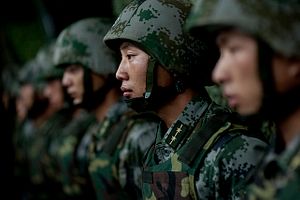On October 23, Chinese President Xi Jinping presided over a major meeting commemorating the 70th anniversary of China’s entry into the Korean War (known in China as the “War to Resist American Aggression and Aid Korea”). It was the second event in five days to feature Xi providing his interpretation of the conflict, following a visit to a museum exhibit on October 19.
This event was decidedly more high-profile. The meeting was livestreamed online and promoted in advance, and the full text of Xi’s remarks was uploaded by Xinhua, China’s state news agency. Like the museum visit earlier this week, the meeting on Friday was attended by all seven members of the Politburo Standing Committee, as well as by Vice President Wang Qishan.
Xi’s speech echoed – but greatly expanded on – the themes of his remarks on October 19. First, he emphasized the Korean War as a David-vs-Goliath struggle, with China standing up for justice against a far more powerful enemy. In his words, the war started when the U.S., acting from its “Cold War mentality,” “interfered” in the resolution of the Korean civil war (translation: North Korea invaded the South, and the United States intervened).
In this “extremely asymmetric” war, Xi said, China won with “less steel, more spirit” against an enemy equipped with “more steel, less spirit”: “The forces of China and North Korea defeated their armed-to-teeth rival and shattered the myth of invincibility of the U.S. army.”
Notably, in Xi’s telling the Korean War is framed as an existential threat to China itself, rather than a war waged entirely on Korean soil. He proclaimed that in joining the war, the Chinese military defeated a nefarious plot to “strangle New China in the cradle.”
But Xi also tries hard to paint this as a victory not only for China, but the world. According to his speech, the end of the Korean War was a triumph for “peace and justice” and a blow to “imperialism.” He claimed that the war “greatly encouraged” the trend toward Asian countries’ independence and liberation from colonial forces.
Moving to the present, he makes clear that the “great spirit” of the war has relevance today. It should serve as a rallying cry for the Chinese people to “continue to march forward courageously toward the new journey of comprehensively building a socialist modernized country, and toward the realization of the China dream of the great rejuvenation of the Chinese nation.”
But Xi also warns that “the road ahead will not be smooth,” and advises China that it will need the martial spirit of the war to overcome today’s challenges. “It is necessary to speak to invaders in the language they know: that is, use war to prevent war… and use a [military] victory to win peace and respect,” Xi said.
That’s a deeply ominous message given the context of spiraling U.S.-China competition. Xi’s framing of the Korean War is essentially this: The United States thought it could stomp China out with ease, but the Chinese people fought their way to a courageous victory despite U.S. military superiority. And only after this victory did they earn the respect of the imperialists.
Applied to today, Xi is advocating for what is generally known as “peace through strength.” But his rhetoric suggests that China will not only not back down from a conflict, but could actually seek one out to win the “respect” it desires. Particularly concerning in that regard is his emphasis on how much the Chinese military learned from the Korean War, which he describes as a painful trial-by-fire necessary to advance China’s military modernization.
In case anyone somehow managed to miss the parallels to the present U.S.-China conflict, Xinhua helpfully published an English-language op-ed headlined, “War commemoration a timely warning to anti-China ‘paper tigers.’” The article makes the lesson explicit:
Arrogance, always doing as one pleases, acts of hegemony, overbearance or bullying will lead nowhere and surely result in a dead end in today’s world, as Xi said in his speech. This is a lesson some politicians in the West must keep in mind when they try to blackmail, block and exert maximum pressure on China.
The victory in the 1950-1953 war is a reminder that China has never been afraid of and will never bow to power politics.
Despite the triumphant nature of Xi’s speech, and its focus on national unity, the Chinese government took no chances in letting the people respond to that messaging. China Digital Times, which often publishes censorship and media directives from the Chinese authorities, released a bulletin from the Cyberspace Administration of China demanding conformity in the livestream of the speech. “It is forbidden to change headings without authorization or activate the on-screen comments function,” the notice warned. “Keep tabs on posts and comments.”

































